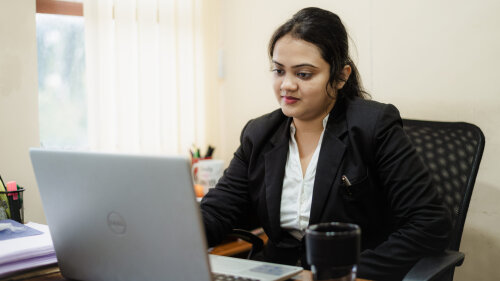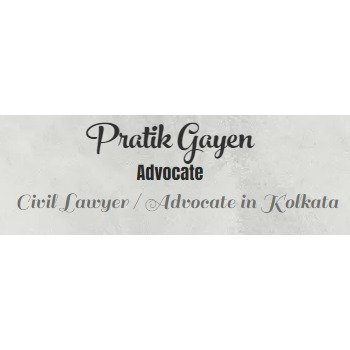Best Family Lawyers in Kolkata
Share your needs with us, get contacted by law firms.
Free. Takes 2 min.
Free Guide to Hiring a Family Lawyer
List of the best lawyers in Kolkata, India
India Family Legal Questions answered by Lawyers
Browse our 10 legal questions about Family in India and read the lawyer answers, or ask your own questions for free.
- I need consultation about whether divorce is a right decision for me not after physical abuse by my husband
- It’s been 1 and half years of my marriage my husband has abused me physically he had slapped me and hit me with belt. Although it’s the first time he’s abused me physically but during these 1 and half years of my relationship he has told me 2 or 3... Read more →
-
Lawyer answer by Qadeer Ahmad Siddiqi Law Associates
I’m truly sorry to hear what you’ve experienced. No one deserves to face physical or emotional abuse in marriage. Even a single incident of violence is taken very seriously under Pakistani law, and repeated threats or abandonment can also amount...
Read full answer - Do you assist with catholic marriage
- Resignation and also assist with church marriage
-
Lawyer answer by mohammad mehdi ghanbari
Hello, good morning Of course, I can assist you with information on how to professionally resign from a job and the requirements for a Catholic marriage. Resigning From a Job When resigning from a job, it is important to do...
Read full answer - Is it possible in same day inter religion marriage
- Is it possible in same day inter religion marriage there
-
Lawyer answer by mohammad mehdi ghanbari
Hello, good morning. Yes, it is possible to have an inter-religious marriage on the same day, but it largely depends on the laws of the country where the marriage takes place and the specific religions of the couple. Some countries...
Read full answer
India Family Legal Articles
Browse our 3 legal articles about Family in India written by expert lawyers.
- A Layman’s Guide to a Landmark Ruling on Rights of Divorced Muslim Women
- The Supreme Court of India, on 2 December 2025, delivered a judgment that carries deep significance for Muslim women across the country. The case, Rousanara Begum v. S.K. Salahuddin (2025 INSC 1375) SC Judgment of 2Dec2025, concerned a simple yet socially important question:When gifts such as cash, gold, or household... Read more →
- Delhi High Court Prescribes Prioritising Human-centric approach in granting Maintenance in Matrimonial Disputes
- The recent Judgment of the High Court of Delhi delivered on 29th October 2025 by Dr. Justice Swarana Kanta Sharma is more than just a legal ruling; it is a humane commentary on the social realities surrounding “payment of maintenance” disputes. While the case arose from a husband’s challenge to... Read more →
- Alimony under Section 25 of the Hindu Marriage Act — A Concise Survey of Law and Recent Authoritative Pronouncements by the Hon’ble Supreme Court of India and High Court of Delhi
- The present article surveys the contours of Section 25 of the Hindu Marriage Act, 1955 (HMA), which empowers matrimonial courts “exercising jurisdiction under this Act” to award permanent alimony and maintenance either at the time of passing any decree or at any point thereafter.This provision is one of the most... Read more →
About Family Law in Kolkata, India
Family law in Kolkata, India governs various aspects related to family matters including marriage, divorce, child custody, adoption, inheritance, and property disputes. These laws are designed to protect the rights and interests of all family members and provide legal recourse in case of any disputes or conflicts.
Why You May Need a Lawyer
There are several situations where seeking legal help in family matters can be beneficial:
- Marriage: If you are planning to get married or need assistance with marriage registration.
- Divorce: In case you are contemplating or going through a divorce, a lawyer can guide you through the legal process, division of assets, and child custody matters.
- Child Custody: If you are seeking custody of your child or want to resolve a custody dispute.
- Property Disputes: If there are conflicts concerning property division or inheritance.
- Adoption: If you are considering adopting a child, a lawyer can assist in navigating the complex legal procedures.
Local Laws Overview
Family law in Kolkata, India is primarily governed by the Hindu Marriage Act, 1955, the Special Marriage Act, 1954, the Guardians and Wards Act, 1890, and various personal laws applicable to different religious communities.
Under the Hindu Marriage Act, both parties must be Hindus, Buddhists, Jains, or Sikhs to marry under this Act. The Special Marriage Act allows people from different religions or religiously unaffiliated individuals to solemnize their marriage.
The Guardians and Wards Act regulates matters related to the custody of minors and appointment of guardians. Personal laws, such as Muslim Personal Law, Christian Personal Law, and Parsi Marriage and Divorce Act, govern marriage, divorce, and other family matters for individuals belonging to these respective religious communities.
Frequently Asked Questions
1. Can I file for divorce in Kolkata if I got married in a different city or state?
Yes, you can file for divorce in Kolkata if you or your spouse is residing in Kolkata or if both parties agree to it.
2. How is child custody decided in Kolkata?
The court considers the best interests of the child while deciding child custody matters in Kolkata. Factors such as the child's age, welfare, and their relationship with each parent are taken into consideration.
3. What is the process of adopting a child in Kolkata?
To adopt a child in Kolkata, you need to approach a recognized adoption agency or consult an adoption lawyer. The process involves completing necessary paperwork, background checks, home visits, and approval from the adoption agency and court.
4. What are the grounds for divorce in Kolkata?
Under the Hindu Marriage Act, grounds for divorce in Kolkata include cruelty, adultery, desertion, conversion to another religion, mental illness, and incurable diseases. Similar grounds exist under other personal laws applicable to different religious communities.
5. How can I resolve property disputes within my family?
If you have property disputes within your family, mediation and negotiation are often encouraged as initial steps to reach a settlement. If a resolution cannot be achieved amicably, you may need to approach the court to seek a legal remedy.
Additional Resources
Here are some resources, governmental bodies, and organizations related to family matters in Kolkata, India:
- Family Court Kolkata: http://www.calcuttahighcourt.gov.in/online-order-process
- Legal Services Authority, Kolkata: http://www.wbja.nic.in/
- Child Welfare Committee, Kolkata: http://www.icds-wcd.nic.in/index.htm
Next Steps
If you require legal assistance in family matters, here are the steps you can take:
- Research and shortlist reputed family lawyers in Kolkata.
- Schedule a consultation to discuss your case and seek legal advice.
- If necessary, engage the services of a lawyer to represent you and guide you through the legal process.
- Follow the advice provided by your lawyer and provide all necessary documentation and information.
- Attend court hearings and comply with any legal obligations to ensure the best possible outcome for your case.
Lawzana helps you find the best lawyers and law firms in Kolkata through a curated and pre-screened list of qualified legal professionals. Our platform offers rankings and detailed profiles of attorneys and law firms, allowing you to compare based on practice areas, including Family, experience, and client feedback.
Each profile includes a description of the firm's areas of practice, client reviews, team members and partners, year of establishment, spoken languages, office locations, contact information, social media presence, and any published articles or resources. Most firms on our platform speak English and are experienced in both local and international legal matters.
Get a quote from top-rated law firms in Kolkata, India — quickly, securely, and without unnecessary hassle.
Disclaimer:
The information provided on this page is for general informational purposes only and does not constitute legal advice. While we strive to ensure the accuracy and relevance of the content, legal information may change over time, and interpretations of the law can vary. You should always consult with a qualified legal professional for advice specific to your situation.
We disclaim all liability for actions taken or not taken based on the content of this page. If you believe any information is incorrect or outdated, please contact us, and we will review and update it where appropriate.
Browse family law firms by service in Kolkata, India
Kolkata, India Attorneys in related practice areas.















